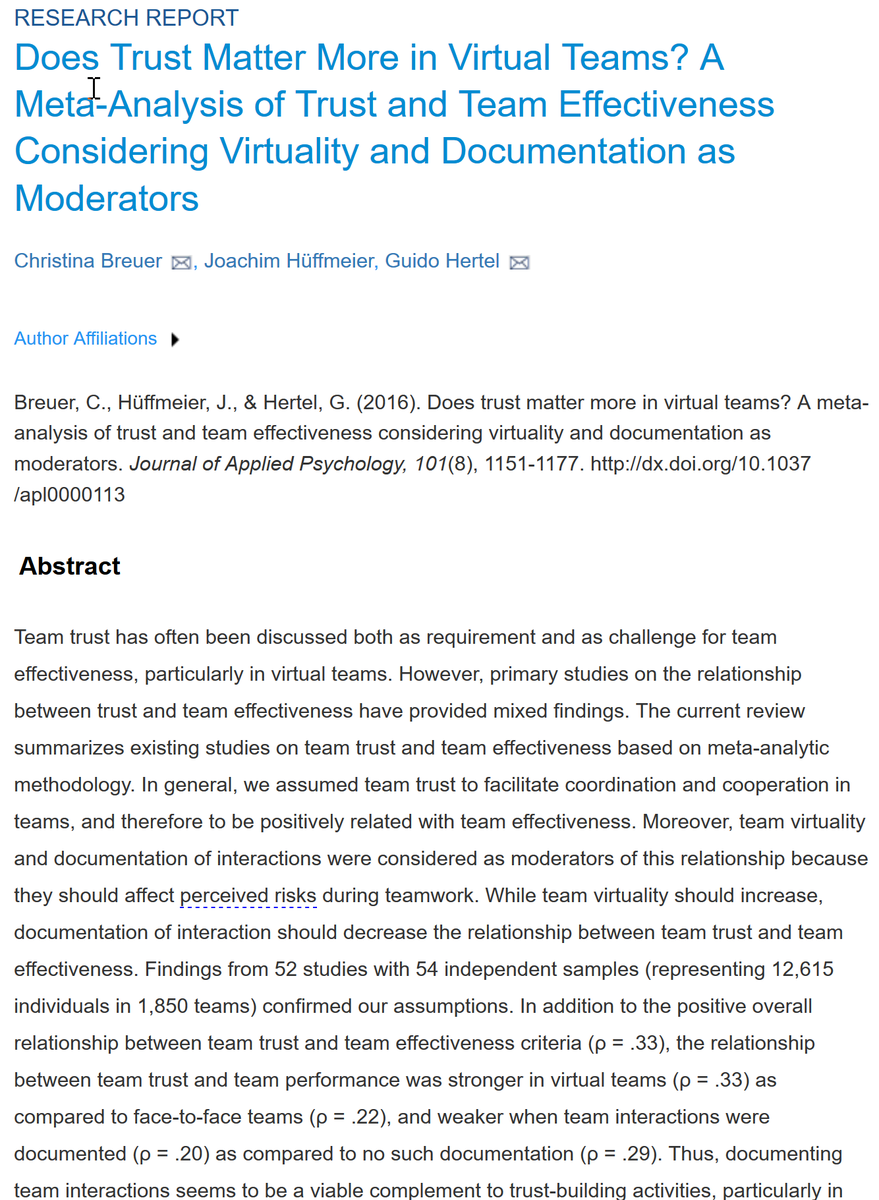A thread on the research on managing virtual teams. Virtual teams are different than face-to-face teams in a bunch of key dimensions. This article is a great (and readable!) overview, but I want to dive into a few unexpected issues with virtual teams. 1/6
https://sloanreview.mit.edu/article/five-ways-to-improve-communication-in-virtual-teams/">https://sloanreview.mit.edu/article/f...
https://sloanreview.mit.edu/article/five-ways-to-improve-communication-in-virtual-teams/">https://sloanreview.mit.edu/article/f...
First, more than face-to-face teams, virtual teams rely on building trust to be effective. Without being physically present, it is harder to know if something is being done and if you can rely on other people. Documenting tasks (even with email) is one way to build trust. 2/6
Emotional management is also really important in remote teams. Emails and communications are frequently misinterpreted (people read positive emails as negative), and without face-to-face contact to fix it, negativity can spread. Err on the side of being more positive! 3/6
You also really should create a team charter or operating agreement for a virtual team. Agree on:
 https://abs.twimg.com/emoji/v2/... draggable="false" alt="📞" title="Telephone receiver" aria-label="Emoji: Telephone receiver">Norms: when & how do you meet? how do you track work? correct errors?
https://abs.twimg.com/emoji/v2/... draggable="false" alt="📞" title="Telephone receiver" aria-label="Emoji: Telephone receiver">Norms: when & how do you meet? how do you track work? correct errors?
 https://abs.twimg.com/emoji/v2/... draggable="false" alt="🎭" title="Performing arts" aria-label="Emoji: Performing arts">Roles: be explicit on who will do what, from leadership to tasks
https://abs.twimg.com/emoji/v2/... draggable="false" alt="🎭" title="Performing arts" aria-label="Emoji: Performing arts">Roles: be explicit on who will do what, from leadership to tasks
 https://abs.twimg.com/emoji/v2/... draggable="false" alt="👉" title="Right pointing backhand index" aria-label="Emoji: Right pointing backhand index">Decision-making: how do you decide?
https://abs.twimg.com/emoji/v2/... draggable="false" alt="👉" title="Right pointing backhand index" aria-label="Emoji: Right pointing backhand index">Decision-making: how do you decide?
4/
4/
Finally, remember to match technology to the kind of communication you need on the team. Collective work require different approaches than individual work, and you need different tools for bursts (video conference, etc) than solo work. 5/6 https://twitter.com/emollick/status/1233827635584737282?s=20">https://twitter.com/emollick/...
Finally, remember that virtual work can actually boost performance over face-to-face interactions, especially for working mothers. Getting good at virtual work is a long-term competitive advantage, beyond the present crisis. 6/6 https://twitter.com/emollick/status/1236842836647129090">https://twitter.com/emollick/...

 Read on Twitter
Read on Twitter




